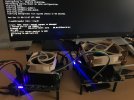As the issue of the iwlwifi network driver is apparently not moving forward from the state of spring, and the bugreports are elegies of anything from dhcp to wifibox and not much useful, I decided to have a closer look myself.
So I've already killed the first nasty vermin 267869, which was simple and didn't need debugging (and encountered a hive of other who are happily celebrating party therein), but then found there is no means to obtain a kernel dump.
This is because suspend/resume does not work without DRM anymore, and panic does not work with DRM anymore, because DRM trausforms a panic into an endless loop of panics, and there will be no dump or reboot.
I finally managed to obtain a dump by jumping into the debugger and entering "dump" there. And now I would like to look into that dump, so I opened the "Developers Handbook", which once had a section about kernel debugging, and found that the commands there don't work anymore, Then I recognized that these have to be installed from ports nowadays, and it came to my mind that we do not use gcc to build the kernel, for quite a while now. I think this is boring - if you fight a monster (or a bug) you want a quick kill, you don't want to wait for boost-libs and texmf and whatever else to download and compile first.
So I wondered if it would be possible to look into a vmcore with the tools that are by default installed on the system, and I vaguely remember that I might once have achieved to do so. But it didn't work anymore.
Then I searched for some description on how it might work now. And indeed I found - tons of hits in the search engine, everywhere! Lots of lengthy papers about debugging FreeBSD with the LLDB debugger.
And they all tell the same: that some moritz(wtf?) is proud to have been engaged by the foundation to develop kernel debugging with LLDB. And then pages and pages of management bullshit with nothing useful at all.
This is just what I found in professional IT: there are shelves and shelves of paper, and they all contain zeroskill. They are there to be moved around in bullshit-bingo meetings, where you can have lengthy talks and then state that there is progress when there is none at all (and obviosely everybody is expected to applaude to the emperor's new clothes).
I always was happy that FreeBSD is different, is from and for the people who want to do something. And I'm starting to wonder if that foundation might start to belong to the other people - those people just moving money, those people who do not have to hunger and freeze...
So I've already killed the first nasty vermin 267869, which was simple and didn't need debugging (and encountered a hive of other who are happily celebrating party therein), but then found there is no means to obtain a kernel dump.
This is because suspend/resume does not work without DRM anymore, and panic does not work with DRM anymore, because DRM trausforms a panic into an endless loop of panics, and there will be no dump or reboot.
I finally managed to obtain a dump by jumping into the debugger and entering "dump" there. And now I would like to look into that dump, so I opened the "Developers Handbook", which once had a section about kernel debugging, and found that the commands there don't work anymore, Then I recognized that these have to be installed from ports nowadays, and it came to my mind that we do not use gcc to build the kernel, for quite a while now. I think this is boring - if you fight a monster (or a bug) you want a quick kill, you don't want to wait for boost-libs and texmf and whatever else to download and compile first.
So I wondered if it would be possible to look into a vmcore with the tools that are by default installed on the system, and I vaguely remember that I might once have achieved to do so. But it didn't work anymore.
Then I searched for some description on how it might work now. And indeed I found - tons of hits in the search engine, everywhere! Lots of lengthy papers about debugging FreeBSD with the LLDB debugger.
And they all tell the same: that some moritz(wtf?) is proud to have been engaged by the foundation to develop kernel debugging with LLDB. And then pages and pages of management bullshit with nothing useful at all.
This is just what I found in professional IT: there are shelves and shelves of paper, and they all contain zeroskill. They are there to be moved around in bullshit-bingo meetings, where you can have lengthy talks and then state that there is progress when there is none at all (and obviosely everybody is expected to applaude to the emperor's new clothes).
I always was happy that FreeBSD is different, is from and for the people who want to do something. And I'm starting to wonder if that foundation might start to belong to the other people - those people just moving money, those people who do not have to hunger and freeze...

